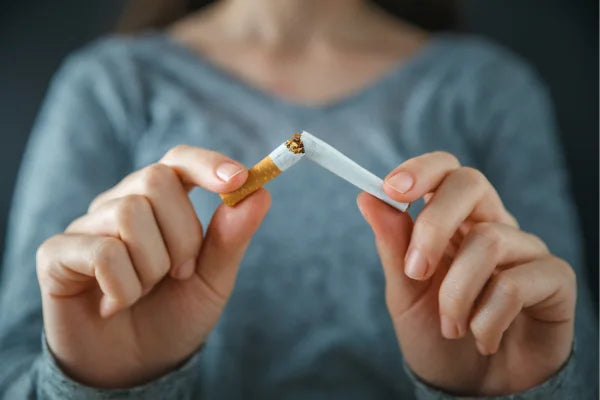
How to Quit Smoking and Improve Health?
Share
How to Quit Smoking: A Comprehensive Guide
Listen to this Article
Table of Contents
Overview
Quitting smoking is one of the most impactful actions you can take for your health. Whether you're trying to quit for the first time or have attempted to quit previously, understanding the process and using the right strategies can greatly improve your chances of success. Smoking harms almost every organ in the body and contributes to respiratory diseases, heart disease, and various cancers. But with the right support, anyone can stop smoking and improve their long-term health.

How Do I Quit Smoking?
Quitting smoking involves both physical and mental challenges. Nicotine addiction is powerful, but with the right strategies, you can overcome it. Here’s how you can get started:
- Set a quit date: Choose a date within the next two weeks to quit. This gives you time to prepare and ensure you're ready.
- Tell others: Let friends, family, and coworkers know you're quitting. They can offer support and encouragement.
- Remove triggers: Get rid of cigarettes, lighters, and ashtrays from your home, car, and workplace.
- Prepare for withdrawal: Know that you might experience symptoms like irritability, anxiety, and cravings, but they’ll pass.
What Can Help with Giving Up Smoking?
There are various strategies and resources available to help you quit smoking. These include both psychological and pharmacological aids:
- Nicotine Replacement Therapy (NRT): NRT products, such as nicotine gum, patches, lozenges, or nasal sprays, help manage cravings and withdrawal symptoms.
- Counseling and support groups: Behavioral therapy, individual counseling, or group therapy can help you develop strategies to cope with triggers and cravings.
- Medication: Medications such as Bupropion (Zyban) and Varenicline (Chantix) can help reduce cravings and the urge to smoke.
- Quit smoking apps: Use apps that track your progress and offer daily motivational messages to keep you on track.

What’s the Best Way to Stop Smoking?
While there’s no one-size-fits-all approach, combining several methods increases the chances of quitting successfully. For example, using NRT alongside counseling can be more effective than relying on either method alone. The goal is to find what works best for you and stick with it.
What Happens When I Stop Smoking?
When you stop smoking, your body starts to heal almost immediately. Here’s a timeline of what happens after you quit:
- 20 minutes: Your heart rate and blood pressure drop to normal levels.
- 8 hours: The carbon monoxide level in your blood drops to normal.
- 48 hours: Your sense of taste and smell begin to improve.
- 1-2 weeks: Your circulation improves, and walking becomes easier.
- 1-3 months: Your lung function improves, reducing coughing and shortness of breath.
- 1 year: Your risk of heart disease is cut in half compared to a smoker.

What Are the Benefits of Stopping Smoking?
Quitting smoking brings many health benefits, including:
- Reduced risk of lung disease: Your chances of developing chronic diseases like COPD and emphysema decrease.
- Improved cardiovascular health: Quitting smoking reduces the risk of heart attacks and stroke.
- Improved lung function: Your lungs start healing, and your breathing improves.
- Better quality of life: Your sense of smell, taste, and overall well-being improve.
- Longer lifespan: Smokers who quit before the age of 40 can add as much as 10 years to their life expectancy.
Top Tips for Stopping Smoking for Good
Here are some practical tips that can help you quit smoking successfully:
- Stay active: Exercise can reduce cravings and improve your mood.
- Practice stress management: Deep breathing, meditation, or yoga can help manage stress, which can trigger the urge to smoke.
- Find a support system: Surround yourself with supportive people who encourage your efforts to quit.
- Reward yourself: Celebrate your milestones, whether it's one day, one week, or one month smoke-free.
How Do I Take Care of Myself If I Smoke?
If you're currently smoking, taking steps to reduce harm is essential for your health. Here’s how you can care for yourself while you work toward quitting:
- Minimize exposure to other toxins: Avoid secondhand smoke and pollutants that could worsen lung damage.
- Stay active: Physical activity helps improve lung function and circulation.
- Monitor your symptoms: Keep track of any shortness of breath, coughing, or other respiratory issues.
What Happens When You Quit?
Quitting smoking leads to both immediate and long-term health benefits. Your body starts to repair itself within hours of quitting, and each day without smoking brings you closer to a healthier, smoke-free life.
- Physical improvement: You’ll feel less fatigued and have more energy.
- Improved breathing: Shortness of breath will decrease as your lungs heal.
- Long-term health benefits: You’ll significantly reduce the risk of serious illnesses like cancer, heart disease, and stroke.
Summary
- Quitting smoking significantly improves your health and increases your life expectancy.
- Using a combination of methods—such as NRT, counseling, and exercise—can increase the chances of quitting.
- Immediate benefits include improved lung function and cardiovascular health, while long-term benefits include reduced cancer risk and a better quality of life.
